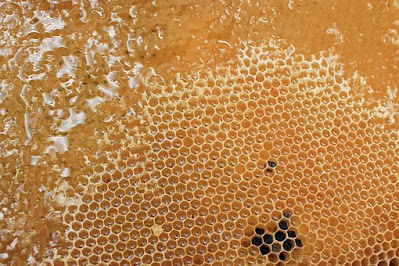Honey is a sweet and viscous substance
produced by bees from the nectar of flowers. It is a natural sweetener that has
been used for thousands of years for its medicinal and culinary properties.
When you start eating honey, several changes happen in your body, ranging from
improved digestion to enhanced immune function. In this article, we'll explore
in detail what happens to your body when you start eating honey.
Energy Boost
Honey is a rich source of natural sugars
like glucose and fructose, which provide an instant energy boost. These sugars
are easily absorbed by the body and converted into energy, making honey an
excellent pre-workout snack. In addition to providing instant energy, honey
also contains complex carbohydrates that provide sustained energy over a longer
period of time.
Improved Digestion
Honey is known to aid in digestion and
relieve symptoms of digestive issues such as bloating, constipation, and acid
reflux. The enzymes present in honey help break down food, making it easier for
the body to digest. Honey also has prebiotic properties that stimulate the
growth of good bacteria in the gut, promoting a healthy digestive system.
Boosts Immune Function
Honey has natural antibacterial and
antifungal properties, which can help boost the immune system. Regular
consumption of honey can help prevent infections, reduce inflammation, and
boost overall immunity. In fact, some studies have found that honey can be
effective in treating respiratory infections, including colds and flu.
Promotes Wound Healing
Honey has been used for centuries as a
natural wound healer. The antibacterial properties of honey help prevent
infection, while the anti-inflammatory properties help reduce swelling and
pain. Honey also stimulates the growth of new tissue, promoting faster healing.
In fact, some studies have found that honey can be effective in treating burns,
ulcers, and other skin conditions.
Lowers Cholesterol
Honey has been found to lower LDL
cholesterol levels (the "bad" cholesterol) and increase HDL
cholesterol levels (the "good" cholesterol). This can help reduce the
risk of heart disease and stroke. In addition, honey is rich in antioxidants,
which can help prevent the oxidation of LDL cholesterol, reducing the risk of
plaque buildup in the arteries.
Regulates Blood Sugar
Contrary to popular belief, honey can be
a good addition to a diabetic diet. While it is still high in natural sugars,
studies have found that honey has a lower glycemic index than sugar, meaning it
does not cause a rapid spike in blood sugar levels. In fact, some studies have
found that honey can actually improve insulin sensitivity and help regulate
blood sugar levels in people with diabetes.
Promotes Better Sleep
Honey contains a natural sugar called
glucose, which can increase the level of insulin in the blood. This, in turn,
helps the brain produce serotonin, a neurotransmitter that regulates mood,
appetite, and sleep. Consuming honey before bed can help you fall asleep faster
and improve the quality of your sleep.
May Help with Allergies
Some people believe that consuming local
honey can help with seasonal allergies. The idea is that by consuming small
amounts of pollen from local plants, the body can build up immunity to the
allergens, reducing the symptoms of allergies. While there is limited
scientific evidence to support this claim, some people swear by the
allergy-relieving properties of honey.
In conclusion, honey is a delicious and nutritious addition to your diet. Regular consumption of honey can provide a range of health benefits, including improved digestion, enhanced immune function, wound healing, and better sleep. When choosing honey, look for raw, unprocessed honey, as it contains more nutrients and antioxidants than processed honey. However, it is important to consume honey in moderation, as it is still high in natural sugars.
 Reviewed by Myanmar channel
on
2月 15, 2023
Rating:
Reviewed by Myanmar channel
on
2月 15, 2023
Rating:







沒有留言: